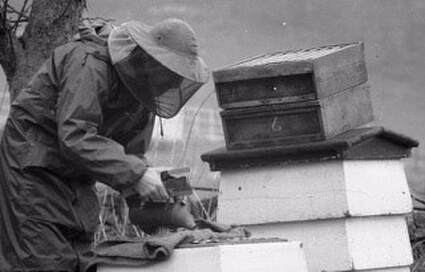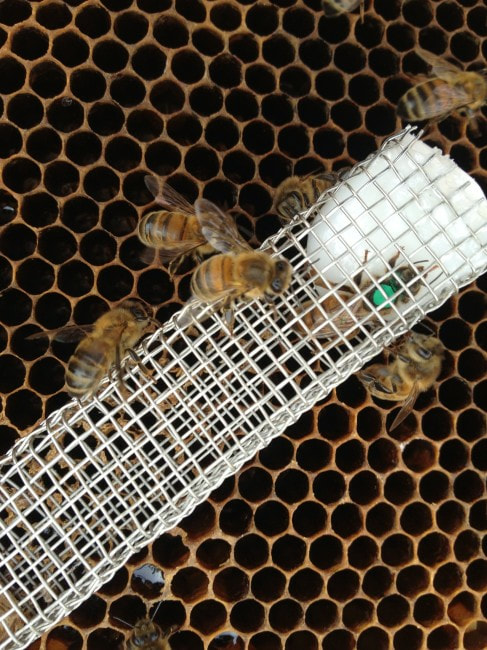NORTH SOMERSET BEEKEEPERS
Introduction to beekeeping
Each year we run a course called Introduction to Beekeeping. Over 10 weeks from January to March we explain the life cycle of the honey bee and cover the basics of beekeeping. This is just the start however as once the course is completed, we invite the class to our teaching apiary. Here they can get hands-on experience of managing honey bees under the guidance of our experienced beekeepers.
Should you then choose to join our branch we can help you find a suitable hive and source a colony of honey bees. During your first season we expect you to keep the bees at the teaching apiary where, every Sunday between 10.00 am and 12.00 noon, a group of experienced beekeepers will be on hand to help you manage your bees and learn the basic techniques of beekeeping. In your second year you will move your colony to a site of your choosing and we will help you by assigning an experienced mentor from the group to guide and assist you.
BBKA
|
The British Beekeepers Association [bbka.org.uk] is the national, charitable organization which represents amateur beekeepers throughout the UK. It organises educational activities and lobbies government on behalf of bees and beekeepers. One of its campaigns involves alerting people to the dangers of the excessive use of pesticides in modern farming, especially the neonicotinoides. Every year the BBKA holds a national conference over several days with guest speakers and a wide range of workshops to assist beekeepers better understand the art and science of caring for honey bees. Currently there are around 25,000 hobbyist beekeepers in the UK. The BBKA works to raise standards in beekeeping and promote the understanding and continuing importance of honeybees in the modern world. Members of the NSBK are automatically given full membership of the BBKA with access to all their services and facilities.
|
The special BBKA education website offers a large range of informative articles, videos and interactive Moodle sessions to help beekeepers of all ages and levels of experience. It is also responsible for a graded series of modules and examinations whereby beekeepers can gain recognised qualifications as they develop their practical and theoretical knowledge and skills.
Try: [learning.bbka.org.uk]
Try: [learning.bbka.org.uk]
BeeBase
BeeBase is the name given to the Animal and Plant Health Agency's (APHA) National Bee Unit (NBU) website. It is intended for beekeepers and supports the government Bee Health Programme. BeeBase promotes the aims of the Healthy Bees Plan 2030, which focuses on protecting and sustaining our valuable national bee stocks.
The BeeBase website [nationalbeeunit.com] provides a wide range of apicultural information for beekeepers, to help keep their colonies healthy and productive. It provides a wide range of beekeeping information, such as the activities of the NBU, honey bee related legislation, pests and diseases information which includes their recognition and control, publications, advisory leaflets and key contacts.
Beekeepers, after registration, can use (for free!) a convenient on-line hive inspection record keeping facility to maintain their observation notes. Should there be an outbreak of a serious disease affecting honeybees, the NBU can quickly alert local beekeepers using this database.
The BeeBase website [nationalbeeunit.com] provides a wide range of apicultural information for beekeepers, to help keep their colonies healthy and productive. It provides a wide range of beekeeping information, such as the activities of the NBU, honey bee related legislation, pests and diseases information which includes their recognition and control, publications, advisory leaflets and key contacts.
Beekeepers, after registration, can use (for free!) a convenient on-line hive inspection record keeping facility to maintain their observation notes. Should there be an outbreak of a serious disease affecting honeybees, the NBU can quickly alert local beekeepers using this database.
queen rearing
A load of queens?
We’ve recently set up a group of branch members who are keen to explore the variety of methods of queen rearing. Most of us have not got a lot of experience in this area but we are keen to work with each other to extend our skills. A knowledge and control of queens in an apiary can help beekeepers in improving the quality of the queens and their colonies and this is our aim. As a group we will be looking at a number of ways of rearing our queens. Broadly they are divided into:
- Grafting from the eggs recently laid by the queen and raising queens from the grafted eggs.
- Alternative methods which involve, for example, taking queen cells that have already been set up in the colony and raising them in a mini queen rearing nuc.






